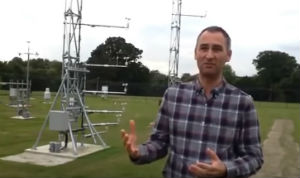Reading in the news - Mon 17 Oct
Release Date 17 October 2016

Please see below a busy round up of media coverage for the University of Reading for Monday.
Climate change deal: Professor Richard Allen commented on the HFCs deal at last week's Montreal Protocol meeting on BBC World News.
Fracking threatens wildlife: A study showing that areas of the UK earmarked for fracking are some of the richest in wildlife was covered in The Guardian, including an interview with Dr Tom Oliver.
Supermoon: Professor Chris Scott's video explaining the best time to see the Supermoon on Sunday night was used by ITV.com and Get Reading and mentioned on Heart Radio.
Conker tree threat: Professor Rob Jackson was on BBC Radio 5 Live (1 hr 28 mins 25 secs) and LBC on Sunday morning to explain why horse chestnut trees are being threatened by disease. Mail Online Sky News, This is Money and Yahoo also ran features quoting Prof Jackson, who was also a guest on BBC Essex and BBC Wales (1 hr 26 mins 45 secs) on Monday morning.
Clinical trials: BBC One South Today covered the University of Reading's new clinical trials unit in partnership with Royal Berkshire NHS Foundation Trust and the Berkshire Healthcare NHS Foundation Trust. Emily Moore also spoke on BBC Radio Berkshire (1 hr 10 mins 10 secs).
Other coverage:
- Dr Gunter Kuhnle was quoted in an Express article on why most superfoods are nutritionally no better than other foods
- BBC Radio Berkshire (1 hr 8 mins 50 secs) went to the Museum of English Rural Life on Monday morning to discuss its imminent reopening. Meanwhile iNews reports that Michael Eavis' muddy Glastonbury wellies will go on permanent display at the MERL
- Get Reading spoke to Prof Roger Brugge on the 29th anniversary of Britain's infamous 1987 storm
- Heart.co.uk ran a feature on how the £5m EU grant for Thames Valley Science Park, guaranteed by the government last week, could create thousands of new jobs
- Dr Ben Neuman, professor of virology at Reading, told The Express how a virus could turn people into zombies
